英语毕业论文范文
英语专业论文英语范文推荐(精选4篇)

英语专业论文英语范文推荐(精选4篇)选择英语文学的毕业论文选题可以从三个方向进行:国别文学研究、文学批评理论研究和比较文学研究。
问渠那得清如许,为有源头活水来,本文是勤劳的小编给家人们找到的英语专业论文英语范文推荐【精选4篇】,仅供参考,希望对大家有一些参考价值。
英语小论文800字篇一1.坚强的意志是成功的重要保证。
2.意志坚定的人才能完成伟大的使命,3.学生也是这样,不刻苦学习,终究不会成为有用之才There is an old saying: where there is a will, there is a way. It tells us that a strong will is the most essential quality that anyone who wants to achieve success. It can contribute a lot to one’s success.Although “All roads lead to Rome”, none of them is completely smooth. Our life is filled with obstacles which may make us feel so hopeless that we may choose to give up. At the crucial moment, strong will helps a lot. As a matter of fact, the ability to work through difficult situation and unfortunate events with strong will can make one stronger and more capable. In other words, if we want to realize life’s goal, we must keep forging ahead with strong consciousness.From what has been discussed above, we can see that the establishment of tough determination is of great importance to everyone. With a strong will, including our knowledge, we will be able to deal with any situation in our life. Whatever we do, as long as we stick to and do not give up easily, we will realize the goal at last.英语专业论文模板篇二“魅力新声”英语歌唱比赛不仅具有较高的学术含量,而且包含较浓厚的英语文化。
英语专业论文(5篇)
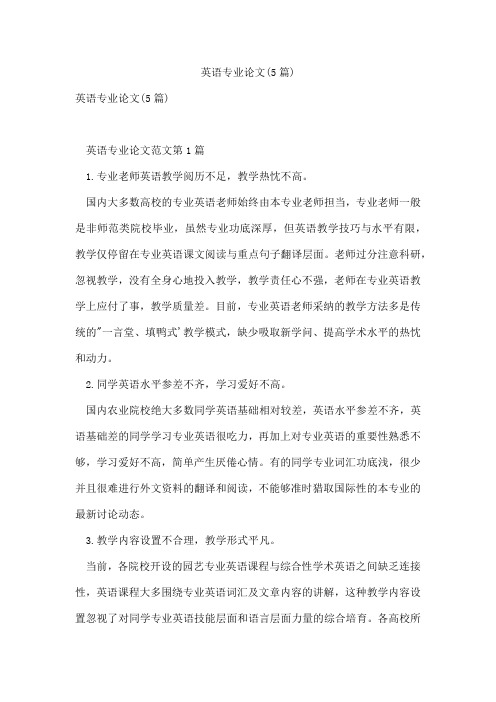
英语专业论文(5篇)英语专业论文(5篇)英语专业论文范文第1篇1.专业老师英语教学阅历不足,教学热忱不高。
国内大多数高校的专业英语老师始终由本专业老师担当,专业老师一般是非师范类院校毕业,虽然专业功底深厚,但英语教学技巧与水平有限,教学仅停留在专业英语课文阅读与重点句子翻译层面。
老师过分注意科研,忽视教学,没有全身心地投入教学,教学责任心不强,老师在专业英语教学上应付了事,教学质量差。
目前,专业英语老师采纳的教学方法多是传统的"一言堂、填鸭式'教学模式,缺少吸取新学问、提高学术水平的热忱和动力。
2.同学英语水平参差不齐,学习爱好不高。
国内农业院校绝大多数同学英语基础相对较差,英语水平参差不齐,英语基础差的同学学习专业英语很吃力,再加上对专业英语的重要性熟悉不够,学习爱好不高,简单产生厌倦心情。
有的同学专业词汇功底浅,很少并且很难进行外文资料的翻译和阅读,不能够准时猎取国际性的本专业的最新讨论动态。
3.教学内容设置不合理,教学形式平凡。
当前,各院校开设的园艺专业英语课程与综合性学术英语之间缺乏连接性,英语课程大多围绕专业英语词汇及文章内容的讲解,这种教学内容设置忽视了对同学专业英语技能层面和语言层面力量的综合培育。
各高校所用的教材主要有自选原版英文教材和自行选编教材两种形式,自编教材内容编排过于古板、陈旧,还有的教材内容难度偏高或者涉及的专业内容过于简洁,不能满意专业要求。
再有,各高校通常采纳传统的"填鸭式'教学模式,偏重于老师的讲解,教学内容枯燥,教学形式单一,忽视了同学的主动性和制造性,同学学习的乐观性不高,同学只是被动接受学问。
这种教学形式比较死板,同学无法参加到教学过程中,扼杀了同学的学习爱好与英语语感的培育,最终导致我国专业英语缺乏创新性的局面。
二、本项园艺专业英语教学改革特色与成效在园艺专业英语教学实践中尝试了一系列园艺专业英语教学改革并取得了肯定成效,详细改革如下。
英语专业毕业论文(纯英文)
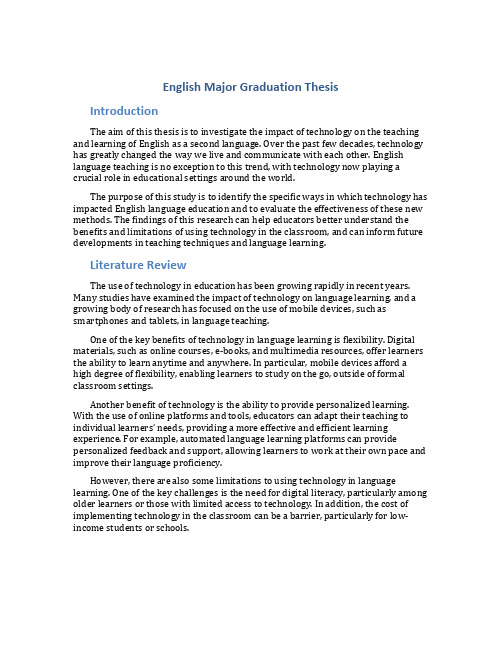
English Major Graduation ThesisIntroductionThe aim of this thesis is to investigate the impact of technology on the teaching and learning of English as a second language. Over the past few decades, technology has greatly changed the way we live and communicate with each other. English language teaching is no exception to this trend, with technology now playing a crucial role in educational settings around the world.The purpose of this study is to identify the specific ways in which technology has impacted English language education and to evaluate the effectiveness of these new methods. The findings of this research can help educators better understand the benefits and limitations of using technology in the classroom, and can inform future developments in teaching techniques and language learning.Literature ReviewThe use of technology in education has been growing rapidly in recent years. Many studies have examined the impact of technology on language learning, and a growing body of research has focused on the use of mobile devices, such as smartphones and tablets, in language teaching.One of the key benefits of technology in language learning is flexibility. Digital materials, such as online courses, e-books, and multimedia resources, offer learners the ability to learn anytime and anywhere. In particular, mobile devices afford a high degree of flexibility, enabling learners to study on the go, outside of formal classroom settings.Another benefit of technology is the ability to provide personalized learning. With the use of online platforms and tools, educators can adapt their teaching to individual learners’ needs, providing a more effective and efficient learning experience. For example, automated language learning platforms can provide personalized feedback and support, allowing learners to work at their own pace and improve their language proficiency.However, there are also some limitations to using technology in language learning. One of the key challenges is the need for digital literacy, particularly among older learners or those with limited access to technology. In addition, the cost of implementing technology in the classroom can be a barrier, particularly for low-income students or schools.Research MethodologyTo investigate the impact of technology on English language teaching and learning, this study employs a mixed-methods research approach. This includes both qualitative and quantitative data collection and analysis.The qualitative component of the study involves semi-structured interviews with English language educators and learners, as well as classroom observations and analysis of digital materials used in teaching. The quantitative component includes a survey of English language learners, involving both open-ended and closed-ended questions.Data analysis will involve both coding of qualitative data and statistical analysis of the survey data. The study will also include a comparative analysis of the effectiveness of traditional teaching methods versus technology-enhanced teaching methods.ConclusionThe growing use of technology in education and the increasing demand for English language proficiency have made it essential to understand the impact of technology on English language teaching and learning. This study aims to provide insights into the effectiveness of technology in language education, identify the benefits and challenges of using technology, and inform future developments in language teaching techniques.The findings of this research can be used by educators and policy-makers to improve the quality and accessibility of English language education, particularly in countries where English is not the primary language. By understanding the potential of technology in language learning, educators can create more effective and efficient teaching methods that meet the needs of learners in the 21st century.。
英文论文(优秀4篇)
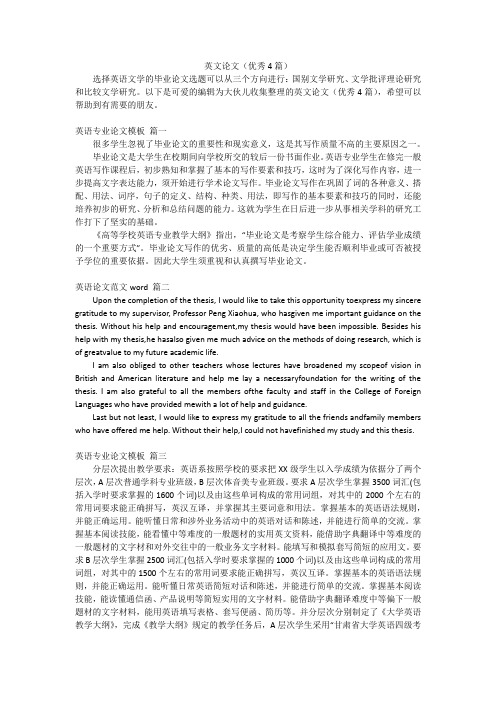
英文论文(优秀4篇)选择英语文学的毕业论文选题可以从三个方向进行:国别文学研究、文学批评理论研究和比较文学研究。
以下是可爱的编辑为大伙儿收集整理的英文论文(优秀4篇),希望可以帮助到有需要的朋友。
英语专业论文模板篇一很多学生忽视了毕业论文的重要性和现实意义,这是其写作质量不高的主要原因之一。
毕业论文是大学生在校期间向学校所交的较后一份书面作业。
英语专业学生在修完一般英语写作课程后,初步熟知和掌握了基本的写作要素和技巧,这时为了深化写作内容,进一步提高文字表达能力,须开始进行学术论文写作。
毕业论文写作在巩固了词的各种意义、搭配、用法、词序,句子的定义、结构、种类、用法,即写作的基本要素和技巧的同时,还能培养初步的研究、分析和总结问题的能力。
这就为学生在日后进一步从事相关学科的研究工作打下了坚实的基础。
《高等学校英语专业教学大纲》指出,“毕业论文是考察学生综合能力、评估学业成绩的一个重要方式”。
毕业论文写作的优劣、质量的高低是决定学生能否顺利毕业或可否被授予学位的重要依据。
因此大学生须重视和认真撰写毕业论文。
英语论文范文word 篇二Upon the completion of the thesis, I would like to take this opportunity toexpress my sincere gratitude to my supervisor, Professor Peng Xiaohua, who hasgiven me important guidance on the thesis. Without his help and encouragement,my thesis would have been impossible. Besides his help with my thesis,he hasalso given me much advice on the methods of doing research, which is of greatvalue to my future academic life.I am also obliged to other teachers whose lectures have broadened my scopeof vision in British and American literature and help me lay a necessaryfoundation for the writing of the thesis. I am also grateful to all the members ofthe faculty and staff in the College of Foreign Languages who have provided mewith a lot of help and guidance.Last but not least, I would like to express my gratitude to all the friends andfamily members who have offered me help. Without their help,I could not havefinished my study and this thesis.英语专业论文模板篇三分层次提出教学要求:英语系按照学校的要求把XX级学生以入学成绩为依据分了两个层次,A层次普通学科专业班级,B层次体音美专业班级。
英语专业毕业论文
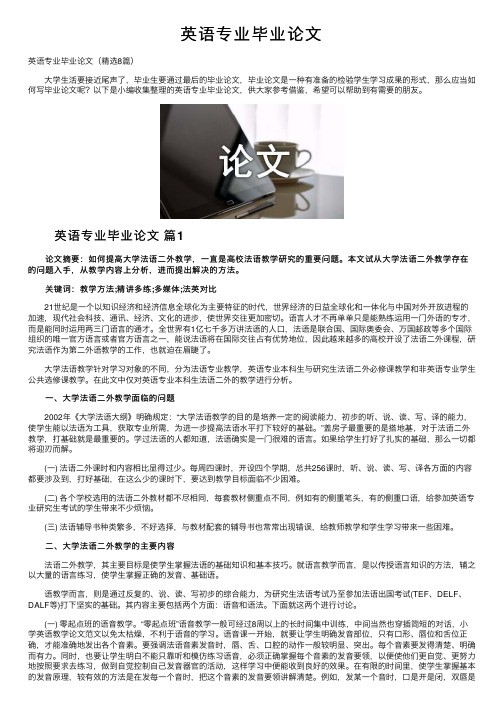
英语专业毕业论⽂英语专业毕业论⽂(精选8篇) ⼤学⽣活要接近尾声了,毕业⽣要通过最后的毕业论⽂,毕业论⽂是⼀种有准备的检验学⽣学习成果的形式,那么应当如何写毕业论⽂呢?以下是⼩编收集整理的英语专业毕业论⽂,供⼤家参考借鉴,希望可以帮助到有需要的朋友。
英语专业毕业论⽂篇1 论⽂摘要:如何提⾼⼤学法语⼆外教学,⼀直是⾼校法语教学研究的重要问题。
本⽂试从⼤学法语⼆外教学存在的问题⼊⼿,从教学内容上分析,进⽽提出解决的⽅法。
关键词:教学⽅法;精讲多练;多媒体;法英对⽐ 21世纪是⼀个以知识经济和经济信息全球化为主要特征的时代,世界经济的⽇益全球化和⼀体化与中国对外开放进程的加速,现代社会科技、通讯、经济、⽂化的进步,使世界交往更加密切。
语⾔⼈才不再单单只是能熟练运⽤⼀门外语的专才,⽽是能同时运⽤两三门语⾔的通才。
全世界有1亿七千多万讲法语的⼈⼝,法语是联合国、国际奥委会、万国邮政等多个国际组织的唯⼀官⽅语⾔或者官⽅语⾔之⼀,能说法语将在国际交往占有优势地位,因此越来越多的⾼校开设了法语⼆外课程,研究法语作为第⼆外语教学的⼯作,也就迫在眉睫了。
⼤学法语教学针对学习对象的不同,分为法语专业教学,英语专业本科⽣与研究⽣法语⼆外必修课教学和⾮英语专业学⽣公共选修课教学。
在此⽂中仅对英语专业本科⽣法语⼆外的教学进⾏分析。
⼀、⼤学法语⼆外教学⾯临的问题 2002年《⼤学法语⼤纲》明确规定:“⼤学法语教学的⽬的是培养⼀定的阅读能⼒,初步的听、说、读、写、译的能⼒,使学⽣能以法语为⼯具,获取专业所需,为进⼀步提⾼法语⽔平打下较好的基础。
”盖房⼦最重要的是搭地基,对于法语⼆外教学,打基础就是最重要的。
学过法语的⼈都知道,法语确实是⼀门很难的语⾔。
如果给学⽣打好了扎实的基础,那么⼀切都将迎刃⽽解。
(⼀) 法语⼆外课时和内容相⽐显得过少。
每周四课时,开设四个学期,总共256课时,听、说、读、写、译各⽅⾯的内容都要涉及到,打好基础,在这么少的课时下,要达到教学⽬标⾯临不少困难。
英语毕业论文
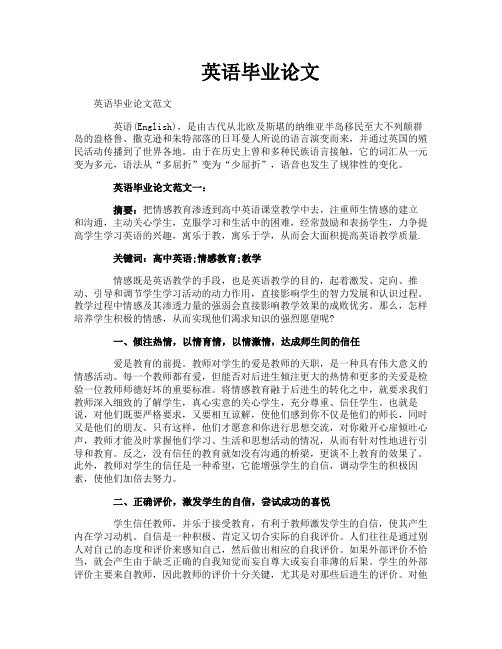
英语毕业论文英语毕业论文范文英语(English),是由古代从北欧及斯堪的纳维亚半岛移民至大不列颠群岛的盎格鲁、撒克逊和朱特部落的日耳曼人所说的语言演变而来,并通过英国的殖民活动传播到了世界各地。
由于在历史上曾和多种民族语言接触,它的词汇从一元变为多元,语法从“多屈折”变为“少屈折”,语音也发生了规律性的变化。
英语毕业论文范文一:摘要:把情感教育渗透到高中英语课堂教学中去,注重师生情感的建立和沟通,主动关心学生,克服学习和生活中的困难,经常鼓励和表扬学生,力争提高学生学习英语的兴趣,寓乐于教,寓乐于学,从而会大面积提高英语教学质量.关键词:高中英语;情感教育;教学情感既是英语教学的手段,也是英语教学的目的,起着激发、定向、推动、引导和调节学生学习活动的动力作用,直接影响学生的智力发展和认识过程。
教学过程中情感及其渗透力量的强弱会直接影响教学效果的成败优劣。
那么,怎样培养学生积极的情感,从而实现他们渴求知识的强烈愿望呢?一、倾注热情,以情育情,以情激情,达成师生间的信任爱是教育的前提。
教师对学生的爱是教师的天职,是一种具有伟大意义的情感活动。
每一个教师都有爱,但能否对后进生倾注更大的热情和更多的关爱是检验一位教师师德好坏的重要标准。
将情感教育融于后进生的转化之中,就要求我们教师深入细致的了解学生,真心实意的关心学生,充分尊重、信任学生。
也就是说,对他们既要严格要求,又要相互谅解,使他们感到你不仅是他们的师长,同时又是他们的朋友。
只有这样,他们才愿意和你进行思想交流,对你敞开心扉倾吐心声,教师才能及时掌握他们学习、生活和思想活动的情况,从而有针对性地进行引导和教育。
反之,没有信任的教育就如没有沟通的桥梁,更谈不上教育的效果了。
此外,教师对学生的信任是一种希望,它能增强学生的自信,调动学生的积极因素,使他们加倍去努力。
二、正确评价,激发学生的自信,尝试成功的喜悦学生信任教师,并乐于接受教育,有利于教师激发学生的自信,使其产生内在学习动机。
英语语言学毕业论文(精选多篇)
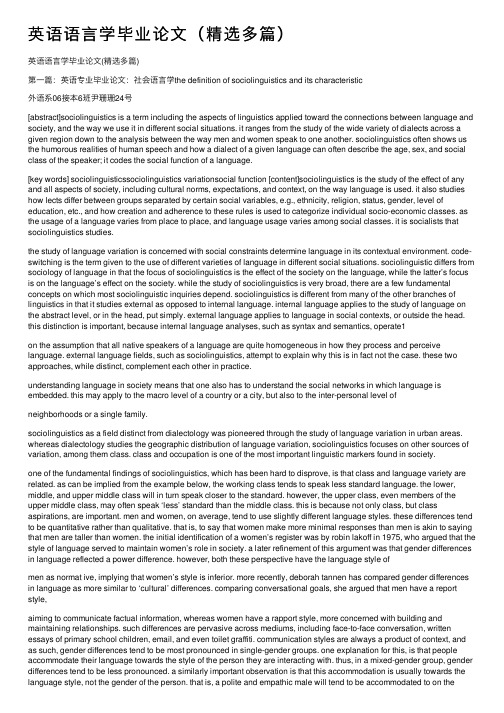
英语语⾔学毕业论⽂(精选多篇)英语语⾔学毕业论⽂(精选多篇)第⼀篇:英语专业毕业论⽂:社会语⾔学the definition of sociolinguistics and its characteristic外语系06接本6班尹珊珊24号[abstract]sociolinguistics is a term including the aspects of linguistics applied toward the connections between language and society, and the way we use it in different social situations. it ranges from the study of the wide variety of dialects across a given region down to the analysis between the way men and women speak to one another. sociolinguistics often shows us the humorous realities of human speech and how a dialect of a given language can often describe the age, sex, and social class of the speaker; it codes the social function of a language.[key words] sociolinguisticssociolinguistics variationsocial function [content]sociolinguistics is the study of the effect of any and all aspects of society, including cultural norms, expectations, and context, on the way language is used. it also studies how lects differ between groups separated by certain social variables, e.g., ethnicity, religion, status, gender, level of education, etc., and how creation and adherence to these rules is used to categorize individual socio-economic classes. as the usage of a language varies from place to place, and language usage varies among social classes. it is socialists that sociolinguistics studies.the study of language variation is concerned with social constraints determine language in its contextual environment. code-switching is the term given to the use of different varieties of language in different social situations. sociolinguistic differs from sociology of language in that the focus of sociolinguistics is the effect of the society on the language, while the latter’s focus is on the language’s effect on the society. while the study of sociolinguistics is very broad, there are a few fundamental concepts on which most sociolinguistic inquiries depend. sociolinguistics is different from many of the other branches of linguistics in that it studies external as opposed to internal language. internal language applies to the study of language on the abstract level, or in the head, put simply. external language applies to language in social contexts, or outside the head. this distinction is important, because internal language analyses, such as syntax and semantics, operate1on the assumption that all native speakers of a language are quite homogeneous in how they process and perceive language. external language fields, such as sociolinguistics, attempt to explain why this is in fact not the case. these two approaches, while distinct, complement each other in practice.understanding language in society means that one also has to understand the social networks in which language is embedded. this may apply to the macro level of a country or a city, but also to the inter-personal level ofneighborhoods or a single family.sociolinguistics as a field distinct from dialectology was pioneered through the study of language variation in urban areas. whereas dialectology studies the geographic distribution of language variation, sociolinguistics focuses on other sources of variation, among them class. class and occupation is one of the most important linguistic markers found in society.one of the fundamental findings of sociolinguistics, which has been hard to disprove, is that class and language variety are related. as can be implied from the example below, the working class tends to speak less standard language. the lower, middle, and upper middle class will in turn speak closer to the standard. however, the upper class, even members of the upper middle class, may often speak ‘less’ standard than the middle class. this is because not only class, but class aspirations, are important. men and women, on average, tend to use slightly different language styles. these differences tend to be quantitative rather than qualitative. that is, to say that women make more minimal responses than men is akin to saying that men are taller than women. the initial identification of a women’s register was by robin lakoff in 1975, who argued that the style of language served to maintain women’s role in society. a later refinement of this argument was that gender differences in language reflected a power difference. however, both these perspective have the language style ofmen as normat ive, implying that women’s style is inferior. more recently, deborah tannen has compared gender differences in language as more similar to ‘cultural’ differences. comparing conversational goals, she argued that men have a report style,aiming to communicate factual information, whereas women have a rapport style, more concerned with building and maintaining relationships. such differences are pervasive across mediums, including face-to-face conversation, written essays of primary school children, email, and even toilet graffiti. communication styles are always a product of context, and as such, gender differences tend to be most pronounced in single-gender groups. one explanation for this, is that people accommodate their language towards the style of the person they are interacting with. thus, in a mixed-gender group, gender differences tend to be less pronounced. a similarly important observation is that this accommodation is usually towards the language style, not the gender of the person. that is, a polite and empathic male will tend to be accommodated to on thebasis of their being polite and empathic, rather than their being male. sociolinguistics has drawn more and more attention since it became an independent discipline in mid 1960s. but scholars from various disciplines look at sociolinguistics from different perspectives, and carry out sociolinguistic study in different ways. this paper tries to understand sociolinguistics in terms of its definitions and the scope of sociolinguisticstudy to point o ut the lack of comprehensiveness in fishman’’s view on the definition of sociolinguistics.参考⽂献:《社会语⾔学概论》戴庆厦主编商务印书馆《社会语⾔学概论》祝畹瑾编著湖南教育出版社.《语⾔学概论》杨信彰⾼等教育出版社第⼆篇:英语语⾔学论⽂题⽬英语语⾔学论⽂题⽬13论国际商务谈判中的语⾔交际技巧33成⼈世界的童话——从⽂体学⾓度解析现今童话再度流⾏的现象49论⽂化差异与英汉商标互译55浅谈英汉句⼦结构差异59诗意的美和喜剧性幽默62试论⼴告英语的语⾔特点65统觉团对英语初学者词汇学习的影响67外语学习中应该重视中介语的作⽤69新闻报道中的转述动词研究73英汉禁忌语、委婉语的对⽐研究74英汉数字习语的对⽐研究76英译汉中词序的变动78英语⼴告的语⾔特征80英语双关语汉译的可译性限度101词义演变的原因与⽅式137从汉语中英语借词的翻译看⽂化交流138从价值观转换看斯佳丽的⾓⾊特征142从礼貌准则看中英⽂化的异同146从习语看英汉民族的⽂化差异149从英语⼈名中看性别歧视157动词过程类型的选择和话语隐性态度的表达161对母语在英语写作中词汇负迁移现象的思考162对严复译作中“信”的质疑167法律英语⽤词特征分析168法律语⾔翻译与法律⽂体177副词ever的句法环境和语义特征180功能语法视⾓下的英语报纸新闻标题的功能183⼴告⼝号语的语⾔特点189国际商务⽂化之对⽐研究204汉语中双关语的翻译213基于概念隐喻的诗歌解读228论⼴告英语中的幽默265论⼴告英语的语⾔特点268论汉英谚语的语⾔特征280论清教理念与美国西进运动282论莎⼠⽐亚⼗四⾏诗中的时间300论英语⼴告中⼏种常⽤修辞格及其汉译310论尤⾦?奥尼尔的表现主义⼿法324名词化的语篇功能330诺曼时期法语对英语词汇的影响339浅谈英语虚拟语⽓的语⽤功能340浅谈英语虚拟语⽓及其语⽤功能345浅析⼆⼗世纪计算机英语词汇的构成特点346浅析汉英动物谚语中的⽂化348浅析英汉语⾔中的性别歧视现象及其根源349浅析英语禁忌语及其发展352浅析英语⽆标志被动句356浅议译者能⼒359认知语⾔学⾓度下“within” 的空间隐喻意义365商标英语汉译的原则和⽅法384体育新闻英语⽂体研究375社会语⾔学视野中的⽹络语⾔418新闻英语中的语法特点研究423颜⾊词在英汉互译中的不对应性425移就的审美价值和⽣成基础426以认知为基础的颜⾊隐喻研究428隐喻认知功能研究的新视⾓429隐喻与⼀词多义的关系438英汉被动句对⽐研究439英汉宾语类型差异的认知原因。
英语毕业论文范文

英语毕业论文范文Graduation Thesis: The Impact of Technology on Education1. IntroductionEducation plays a crucial role in shaping individuals and societies. Over the years, technology has had a profound impact on various aspects of education. This paper aims to discuss the positive and negative effects of technology on education and explore the potential future developments.2. Positive effects of technology on education2.1 Improved accessibility: Technology has made education more accessible to people globally, breaking the barriers of distance and time. Online courses and virtual classrooms enable individuals to learn from anywhere at any time.2.2 Enhanced engagement: Technology can make learning more interactive and engaging. The use of multimedia tools such as videos, animations, and games can stimulate students' interest and improve their understanding.2.3 Personalized learning: Technology allows educators to tailor instruction to individual students' needs and interests. Adaptive learning software can provide targeted feedback and content based on students' performance, helping them progress at their own pace.2.4 Collaborative learning: Technology facilitates collaboration and communication among students and teachers. Online forums, video conferencing, and document sharing platforms enable students to work together on projects and exchange ideas.3. Negative effects of technology on education3.1 Distractions: The prevalence of technology in classrooms canbe a distraction for students. The temptation to use social media or play games during class time can hinder their focus and academic performance.3.2 Information overload: With the vast amount of information available on the internet, students may find it challenging to discern reliable sources and filter out irrelevant information. This can lead to a lack of critical thinking skills and a decrease in the quality of research.3.3 Inequality: The access to technology and digital resources is still unequal worldwide, creating a digital divide between students from different socioeconomic backgrounds. This disparity can further widen the educational gap.4. Future developments in technology and education4.1 Artificial Intelligence (AI): AI has the potential to revolutionize education by providing personalized and adaptive learning experiences. Intelligent tutoring systems can analyze student data and tailor instruction accordingly, improving learning outcomes.4.2 Virtual Reality (VR): VR technology can create immersive learning environments that enhance students' understanding and engagement. Students can virtually visit historical sites, explore the human body, or practice complex skills in a safe and controlled setting.4.3 Online learning platforms: The popularity of online learning platforms is likely to continue growing. These platforms offer a wide range of courses and certifications from renowned universities and experts, making education more accessible and affordable.5. ConclusionTechnology has undoubtedly transformed the field of education, bringing both advantages and challenges. As technology continues to advance, it is crucial to strike a balance between embracing its potential benefits and addressing its negative impacts. By harnessing technology effectively, education can become more inclusive, engaging, and tailored to individual students' needs, ultimately preparing them for the demands of the future.。
毕业英语论文范文

毕业英语论文范文毕业论文(设计)质量是衡量高等职业院校办学成果最为重要的依据之一,也是评价一个学生综合素质的重要标尺。
下面是小编为大家推荐的毕业英语论文范文,供大家参考。
毕业英语论文范文范文一:商务英语毕业论文Implication of Cultural Differences on International Business NegotiationsAbstractBusiness negotiations under different cultural conditions are cultural negotiations. With the development of economic globalization and frequent business contacts,cultural differences havebecome very important. If they are neglected, they could cause unnecessary misunderstanding,or even undermine the result of business negations. Therefore, it is of great significance to know different cultures of different countries as well as ways to avoid cultural conflicts in the context of international business negotiations. The paper begins with the definition of culture,analyzes the causes of cultural differences and explains the impact of cultural differences on international business negotiations from three perspectives of communication process,negotiation style and values concept. Finally,it analyzes effective ways to deal with the problem arising from cultural differences in the negotiation process. The paper stresses that in business negotiations between different countries negotiators should accept the other party's culture, try to make him be accepted and make a correct evaluation with help of effective communications. In a word,for successful cultural negotiations,cultural differences need to be perceived,accepted and most importantly played down.Key words:culture cultural difference business negotiation impactContents1. Cultural difference (4)1.1 The definition of culture (4)1.2 The causes of cultural differences (4)1.2.1 Geographical differences (4)1.2.2 Ethnic differences (4)1.2.3 Political differences (4)1.2.4 Economic differences (4)1.2.5 Religious differences (4)1.2.6 The concept of difference (5)1.3 Importance of international business negotiations on Cultural differences (5)2. Cultural differences on the impact of international business negotiations (5)2.1 Communication process (5)2.2 Negotiating style (8)2.3 Values (8)2.3.1 Ethics (8)2.3.2 Sense.............................................................................. (8)2.3.3 Concept of Collective (8)2.3.4 Concept of time (8)3. How to deal with international business negotiations and culturaldifferenc es (9)3.1 To learn more about the former in the negotiations of the cultural differences that may arise (9)3.2 In the negotiations necessary to correctly handle the cultural differences (9)3.3 Negotiations to do a good job of follow-up for the exchange of cultural differences (10)4. References (11)Business negotiation in interpersonal relationships as a special form, relate to different geographical, ethnic, social and cultural exchanges and contacts, which have taken place in cross-cultural negotiations. In cross-cultural negotiations,the different geographical, ethnic, cultural differences will affect the thinking of those negotiations,the negotiation style and behavior,thus affecting the entire negotiation process. Therefore, to engage in business activities, especially for the cross-border business activities must understand and master the links between different cultures and differences. Conducting negotiations with the organization,also have to understandthat cultural differences impact on the negotiations, only the face of such a positive impact on the desired objectives can be achieved1. Cultural differences1.1 the definition of cultureNational culture is a country-specific concepts and value systems,which constitute the concept of people's lives and work behavior. The nations of the world as a result of specific historical and geographical and gradually formed its own unique cultural traditions and cultural patterns. As the difference of Chinese and Western traditional customs,values,religious beliefs , different ways of thinking, etc, making the different performance of Chinese and Western cultures.1.2 the causes of cultural differencesCultural diversity caused by many reasons, T o sum up, the main source of cultural differences are in the following areas:1.2.1 geographical differencesRefers to the geographical differences in different geographic regions due to the geographical environment, the level of economic development and traditional differences in habits,people often have different language,lifestyle and hobbies. And these will affect their behavior. For example, the West and the American people in some countries treat Christmas important, but in areas such as near the equator do not have snow all the year round, the people of some African countries may not have the concept of Christmas because the best modified Christmas is snow, as to the people in the region that are not long-term snow ,there is little concentration of Christmas than American States.1.2.2 national differencesEthnic differences is the different ethnic groups in the development of long-term process, the formation of their own language,customs and preferences,habits. Their diet,clothing,accommodation,festivals and rituals,such as material and cultural life of their own characteristics. Take the history of our country and our Hun Han, the Xiongnu people are valiant, characteristics of typical nomads. And we tame the Han character,the typical characteristics of farming nation. Which led to the Huns in the diet, clothing, accommodation,festivals and rituals,such as material and cultural life are different with Han.1.2.3 the political differencesPolitical differences are due to the political system and the policies and regulations on people's behavior with the role of a standardized, so that all peoples in the political aspects on the concept of the existence are differences. Take the United States and France as example, the United States by the Constitution the powers of the President of the severe restrictions on the two major powers with other institutions of Congress and the Supreme Court of strong constraints. While France also had to set was ready to royalist restoration of the monarchy of the Third Republic to amend the Constitution a little further expand the powers of the president.1.2.4 economic disparitiesEconomic differences are result of the economic factors of a reflection of cultural differences. For example, the people in the Western developed countries are rich lives and high level of education, people will pay more attention to the quality of life,security means more generally. And economic backwardness of the Third World, people care more about food and clothing.1.2.5 religious differencesReligion is the development of human society to a certain stage of historical phenomenon, Religion has its own (Catholic) Major epidemic in Western Europe and South American; Islam is the scope of the whole of the Middle East and North Africa. Buddhism is more prevalent in Asian countries. The world has three major religions: Christianity,Buddhism and Islam. Christian (Protestant) is major epidemic in Northern Europe,North America and Australia; people in many parts of Asia believe in Buddhist. Different religions have different cultural tendencies and precepts,which affect the way of people understand things, codes of conduct and values.1.2.6 the concept of Values differenceValues are means of objective evaluation criteria of things. It includes the concept of time, wealth, the attitude towards life,the attitude to risk and so on. Different societies’ people to the same things and problems will come to different and even opposite conclusions.Geographical differences,ethnic differences,political differences,economic differences,religious differences and differences in concepts have the impact on people's penetration in the food, clothing, accommodation, festivals and rituals,such as material and cultural life in all its aspects. Thus affecting people's behavior,values,religious beliefs and modes of thought have a lot of difference, Finally has formed the various countries and areas of cultural differences.1.3 cultural differences on the importance of international business negotiationsPractice in the negotiations, many negotiators often do not understand,or took note of the cultural importance of thesignificant impact on negotiations. Negotiating parties for foreign culture,some negotiators may have noticed some of the other negotiations, "different" or "hard to understand" the concrete manifestation of negotiations,but that is not important. Some people blindly believe that negotiation is the use of foreign-related facts and figures to speak, and the facts and data are common. Similarly,some foreign countries’ negotiators to negotiations with each other to maintain harmonious relations, they will notice the similarities between both cultures, while ignoring their differences. Let's look at an example.In 1992,negotiators from China and other 12 experts of different professions to form a delegation to the United States purchases about 30 million U.S. dollars of chemical equipment and technology. The US naturally does everything possible to satisfy them. One of them is negotiations in the first round of the delegation sent to each of them a small souvenir. The Souvenirs packaging is very particular is a beautiful red box,red for advanced. But when the delegation was pleased to open the box when face-to-face in accordance with the Americans,Everyone's face appears very not the nature actually--there is a golf cap,but the color is green. American businessman's intention is: after signing the contract,and everyone to play golf. But they don’t know the "be a cuckold" is the biggest taboo in Chinese men. Finally the delegation did not sign the contract,not because the Americans "insult" people,but because they work careless,and even don’t know the common sense that Chinese men taboo "be a cuckold". How can we feel free to tens of millions of dollars project to them? It can be seen that the failure of the Americans negotiation is due tothey do not understand the Chinese culture.From the above examples,we can learn in business negotiations,if we do not attach importance to each other's cultural differences, the negotiations are likely to lead to failure.2. Cultural differences on the impact of international business negotiationsThe impact of culture on negotiations is extensive and profound,and different cultures will naturally divided people into different groups, this region, the difference between their respective groups are bringing people of different cultural groups tend to alienate each other; On the other hand, different cultural communication and exchanges between people are also obstacles. Therefore,the requirements of the negotiators to accept each other's culture, but also by cultural differences,unmistakably reveals that the purpose of understanding of each other's behavior,and they have been accepted by the other party, and ultimately reach a consensus agreement.Overall, the impact on culture negotiations are in following several aspects:2.1 the communication processCultural differences on the communication process of the negotiations,first of all is the performance of the communication language in the negotiation process. Language is a bridge of any country, any region and any nation. States companies, individuals to conduct business negotiations, we must first have the language to this. The differences language of international business activities is the most direct and clear. Such as China's "white elephant" brand batteries,to the English "White Elephant" it would cause bad associations.Because the "White Elephant" In addition to the name ofanimals that have two meanings: "The owner did not use, but may be useful to others; do not reuse things." Solve the language problem is very simple,you can hire a translator or use a common third language to talk. While the negotiators of the language used in a variety of cultures with higher fitness, but no matter what, the difference is obvious. Such as Japan, Brazil and France Culture,the Japanese style of business communication is the most polite, more positive commitment to the use of recommended and guarantees,and less use of threats, commands and warnings of freedom of speech, their manners of speech style, The most prominent is that they do not often use "no", "you" and facial gaze, but to maintain a period of silence; Brazilian businessmen to use "no" and "you" at the higher frequency,their negotiation style seems more presumptuous, and it seems not lonely in the negotiations, to gaze at each other and touch each other from time to time; French businessmen negotiating style is all the most presumptuous, in particular, their use of threats and warnings at the highest frequency,in addition,they are still very frequent use of interrupted, facial gaze, as well as "no" and "you". It can be seen, only to clarify these differences that can avoid the reticent Japanese,Brazilian over enthusiasm or the French’s misunderstanding of the threat, which achieved the success of international business negotiations.Cultural differences impact on the negotiation process not only in the process of language communication, but also in the process of non-verbal communication. Cultural differences will lead to different countries or regions in the body language of negotiations, the use of action language significantly different,or even the same language of action is diametrically opposed tothe transfer of information. For example, the vast majority of countries are in favor of nod his head for agree. But in India,Nepal and other countries that are certainly shaking his head,that is, shaking his head and smiling, that is positive meaning,some people just do it diagonally on the rise is still a good way,some people are a population frequency said "You are right! You are right!" but a continuously shaking his head,often make others do not know its true psychological and full of doubt. But negotiators shape, movement, language, awareness and use of the differences, also create an obstacle for the negotiations in communication.Cultural differences also can lead to the negotiators of the differences in communication. People of different cultures have their preferences and habits of communication and cross-cultural negotiations in the negotiating parties often belong to different cultures, have their own customary means of communication. Accustomed to different means of communication between the parties to conduct a more depth in communication, often cause a wide range of issues. From countries with a high culture of the negotiators and those from countries with low culture of the negotiators may be in different ways of expression during the negotiation process. From countries with a high culture of the negotiators may be chosen euphemism,indirect ways to express their meaning. While from low culture of the negotiators preference for using oral expression to negotiate,direct or receive a clear message,straightforward means to express themselves. These two negotiators from different cultures during the negotiations,the party think the other side is often too rough,while the other may think that the other side lack of good faith in negotiations, or misunderstanding the silence ofeach other's conditions for its approval.2.2 the negotiation styleThe negotiation style is the main bearing and the attitude which displays in the negotiations activities. the style of negotiations in the course of negotiators’ behavior, conduct and control of the negotiation process of the method and means. Negotiators negotiations Style with a deep cultural stigma. Culture not only determines the Ethics Code of Ethics for negotiators,but also affects the way of thinking negotiators’ behavior and personality,so that make the negotiators of different cultural backgrounds form a very different style of negotiation. Negotiating style of the negotiation process for the negotiations between the two sides approach the relationship,contacts, and even the structure of the negotiations has a direct impact.Adhere to cultural differences,negotiating styles can be divided into two types: the negotiation style of Oriental and Western style negotiations. Oriental style is based on negotiations as the background of oriental culture of Asian countries negotiation styles,with Japan,South Korea for a typical representative:Japanese business men are conservative,attention to status-oriented,credit and the initial cooperation,co-dependent relationship between stress and good at negotiating. Japanese attached great importance to the negotiations in the transaction to establish harmonious interpersonal relationships. If there had been contacts with Japanese,before the negotiations should be recall the past exchanges and friendship between the two sides,which will be beneficial to the next negotiations. They did not support and habit the direct, purelycommercial activities. If it is the first time to establish trade relations with Japanese, the party responsible for higher status in charge visits in opposite party enterprise at the same level status person in charge is extremely important,it attached great importance to Japanese companies and the trading relationship with you. When negotiations with Japan,it’s the best to send staff rank and status at high-level than the other side. This will facilitate the conduct of the talks. It should also be noted that Japanese women's status in society is lower,generally they not allowed to participate in the operation and management of large companies activities,the Japanese are also in a number of important occasions of non-female. Therefore, when encountered formal negotiations generally not appropriate to allow women to participate in, or else they may be skeptical, and even expressed dissatisfaction.Korean character stubborn, often stuck to their own views in the negotiations and will not easily compromise. In this case we must grasp the strategy, it is necessary to adhere to argue,but also common sense to master a certain sense of propriety,and sometimes also need to be patient. On the other hand,South Korea in the negotiations seldom to express the views directly, often need the other side to try to figure out, in order to accurately understand the meaning of each other,South Korea may ask the same question repeatedly,so that when making decisions to ensure the correctness. And South Korea signed a contract does not mean that their success will not be changed, for other reasons they would seek to amend or re-start negotiations with you.Western-type style of negotiation is based on Western culture of Europe and the United States as the background styleof negotiations. The main representatives are the United States and United Kingdom.Americans often talk about "Business is Business" (business to the business) means doing business need to not recognize one's own closest relatives, insist on the principle of things not for people. "Time is money","money is everything" is the unswerving credo of American. Their business activities is often straightforward,be anxious for success,business came straight to the point, they always picking up the phone to talk,sit down and get straight to the point,They calculate the progress by the hour and the number of days, their opponents often feel pressure from them. American businessmen do not like the use an agent or participate in negotiations with the consultant,give others the impression that they can say on behalf of the company. They like to sit down to do business immediately. In addition,the United States businessmen attached great importance to economic benefits, they have a slang called: "Bang for Buck", that is, with minimum capital investment to obtain the greatest benefit.British merchants engaged in commercial activities pay more attention to informal traders than other countries in the world,but also more conservative. Even today, the world has entered the electronic information age, in the UK by telephone to talk about business is unacceptable. British businessmen are more willing to make full preparations in advance, and then face-to-face talks. As long as they do not believe that the details of a settlement will not solve, they will never sign, all must have to do as rule. As a result of the British very great importance to the position, the title is also very important to them. Therefore,the selection status of the person as a broker of highly influentialbusiness,political forces and the role of trade unions in the business also can not be neglected.Of course,it also must pay attention to the actual negotiations process, although the same cultural background of the negotiators, the talks there was a clear difference, but subject to sub-culture,as well as other factors,the same cultural background of individual negotiators, the negotiations style can be very different.2.3 Cultural valuesCultural values is measure the consequences of people's behavior and standards. They affecting the way of people understanding the problems and will give rise to a strong emotional impact. In different cultures,values will be very different. Culture in a very appropriate behavior in another culture may be seen as immoral. For example,Americans believe that nepotism is immoral, however it as an obligation at the majority of Latin American culture. Therefore,the Understanding of a certain society in popular as well as these ideas in the personal behavior the degree which respects is very important. Our discussions here will focus on those activities is essential to understand the socio-economic values,more specifically,is these for promote the cross-cultural communicative competence and the values is worth noting.2.3.1 EthicsChina has heavier ethics. "Acquaintance" and "relationship" has its own special meaning and significance, once the relations have been established,the two sides have become acquaintances or friends, and generous concessions to help the situation appear, and the degree of trust and tolerance will be improved,so the Chinese people have more oral agreement.Americans is not the case,they do not pay attention to cultivating the feelings of both sides, and attempts to separate business and friendship. To deal with the problem, often used the legal means, lawyers come forward to solve the problem is common,it is flexible and not rigid,we should clearly recognize this point. However,once sign the contract,they are very much focused on the legal contract, the performance of the contract is higher. The Chinese delegation to the West,maybe a long time no one could entertain,and this misunderstanding of the people are not interested in their visit; Europeans come to China, No matter what they do may find that there are people who accompanied,and this misunderstanding of the people lack of trust in them. Of foreign visitors, a senior care too much, not to mention dinner, often mistakenly believe that this expressed his company's products or have a preference, this in fact is the Chinese hospitality, This can lead to subsequent disappointment, and even complain.2.3.2group awarenessIn the course of the Chinese and Western cultural traditions and different cultural values, on the negotiations issues tend to have a confrontation or misunderstanding. China's national character has a very remarkable phenomenon, that is Settles on the face or the dignity. At the negotiating table, if make a choice from "decent" and "interest", both the Chinese people will often choose to "decent." Why do the Chinese people want to save face at all costs? Because of the ideological core of Chinese culture is a group consciousness. In accordance with the sense that each one is not a separate person,but living in a certain social relations, and no face will not the face of others, there is no face on the people and will not be able to live in the social andgroup life,and may even be abandoned by society and the groups. But not like Westerners,they value the interests of negotiations,they will not hesitate to choose interest from "decent" and "interest" of the two. Chinese people regarding negotiations result whether can bring honor for their face, looks extremely important,as well as some Western negotiators in their works cautioned China in the talks, we must note that use of China's national character. It is clear that only a correct understanding and properly grasp the existence of Chinese and Western differences in national character, can effectively help us in a timely manner to correct our own shortcomings and strengthen our own advantages and use of other's shortcomings to collapse of other's strengths.2.3.3 the concept of collectiveChina's concept of collective a stronger emphasis on collective responsibility,Therefore the negotiations pattern basically is the collective, but to make the final decisions are a decisive one, and even the decisive one simply has not entered the stage. This is known as the cultural experts of "high from the right to culture",in the event of difficult issues more complicated, the negotiators on the difficult decisions; and the Western culture of Jurists which was referred to as "low from the right to culture",on the surface is one or two people out,negotiators have been given the appropriate permissions,or assisted in its decision-making think-tank,which in the negotiations,the sole responsibility of the negotiations were heavier, higher and more flexible.2.3.4 the concept of timeConcept of time and how it decided the people's action plan for international business negotiations has a broad impact of theinvisible. The daily negotiations behavior manifests observes the difference aspect of time may be is the most obvious results of the performance. Jewish businessmen attached great importance of time. They always believe that time is not money, time and goods, is the capital to make money. Money can borrow, but time can not be borrowed,the time is more valuable than money. A wealthy Jewish income of 200,000 US dollars monthly have been considered such an account: his daily wage is 8 1000 U.S dollars,then about 17 U.S. dollars per minute. If he had been disturbed and waste 5 minutes, then is the equivalent of stolen 85 U.S. dollars in cash. Strong concept of time improved the efficiency of the Jews, they are often at work in seconds and every second counts. On the Jewish people, never appear leave early,late,or to stall for time and so on. In the business activities of the Jews "Uninvited guest" is almost as the same as the “unwelcome person”,because uninvited guests will disrupt the timing of the original, and waste everybody's time. For the time extremely mean of the Jewish,in the time to discuss the concept of time is stronger. Before Jews in the negotiations, the time must have been agreement. They agreed not only in a certain period of a day,but also appointment "from the starting points to a few minutes to talk about." During the meeting, in addition to polite greetings outside, the Jews immediately to discuss business, this is have good manners and good performance, at the same time that mean respect of each other.3. how to deal with the cultural differences on international business negotiationsOnly recognize and accommodate cultural differences can take the whole process of negotiations in response to。
毕业论文以为例英语

毕业论文以为例英语Title: The Importance of Graduate Thesis Papers in English: A Case StudyIntroduction:In recent years, the significance of graduate thesis papers in the field of English studies has gained attention due to various factors such as globalization and the increasing importance of English as a global language. This article aims to explore the importance of graduate thesis papers in English by presenting a case study. By analyzing the impact of these papers on students' academic and professional development, this study will further provide insights into the significance of writing such papers.Body:1. Enhancing Research Skills:A graduate thesis paper in English requires students to conduct extensive research, analyze existing literature, and critically evaluate information. This process enhances students' research skills and equips them with the ability to formulate coherent arguments and substantiate them with evidence. These skills are not only valuable in theacademic realm but also in professional settings, enabling students to contribute effectively to their chosen field.2. Language Proficiency:Writing a graduate thesis paper in English demands a high level of language proficiency. Through the process of drafting and revising their papers, students are able to improve their vocabulary, grammar, and overall writing skills. These linguistic abilities are vital for effective communication, enabling students to express their thoughts clearly and professionally.3. Analytical and Critical Thinking:Engaging in the process of crafting a graduate thesis paper requires students to think critically and analytically. They must analyze and synthesize relevant literature, identify research gaps, and provide meaningful insights. These skills allow students to approach problems and situations with a critical mindset, making them better problem solvers and decision-makers in both academic and professional settings.4. Knowledge Acquisition:The process of writing a thesis paper involves delving deep into a specific research topic, which leads to a substantial increase in knowledge and understanding.Students are required to explore different theoretical frameworks, perspectives, and methodologies related to their chosen subject. This acquired knowledge not only serves the purpose of the thesis but also serves as a foundation for future research and academic pursuits.5. Professional Development:Completing a graduate thesis paper demonstrates a student's ability to work independently, manage time effectively, and meet deadlines. This showcase of professionalism is highly regarded in the job market, as it indicates discipline and dedication. Furthermore, the research skills acquired during the process of writing a thesis paper are transferable skills that can be applied in various professional settings.Conclusion:In conclusion, graduate thesis papers in English play a pivotal role in the academic and professional development of students. By enhancing research skills, language proficiency, critical thinking abilities, and knowledge acquisition, these papers contribute significantly to a student's overall growth. The case study presented in this article reinforces the importance of conducting research and writing a graduate thesis paper,highlighting how it prepares students for their future endeavors in the field of English studies.Word count: 427 words。
英语专业优秀毕业论文
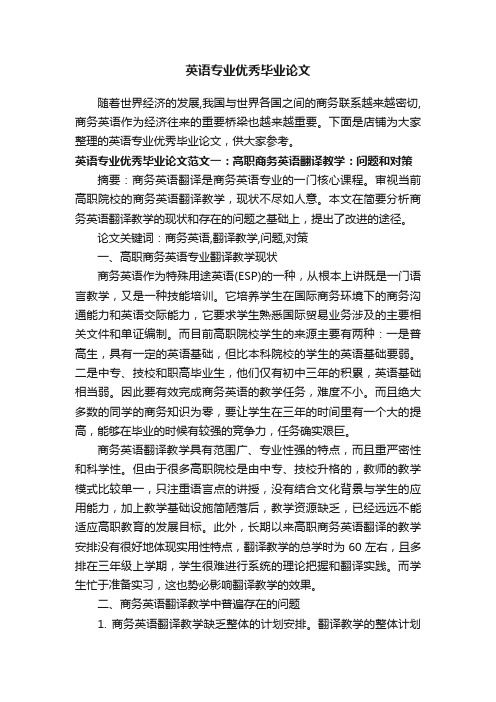
英语专业优秀毕业论文随着世界经济的发展,我国与世界各国之间的商务联系越来越密切,商务英语作为经济往来的重要桥梁也越来越重要。
下面是店铺为大家整理的英语专业优秀毕业论文,供大家参考。
英语专业优秀毕业论文范文一:高职商务英语翻译教学:问题和对策摘要:商务英语翻译是商务英语专业的一门核心课程。
审视当前高职院校的商务英语翻译教学,现状不尽如人意。
本文在简要分析商务英语翻译教学的现状和存在的问题之基础上,提出了改进的途径。
论文关键词:商务英语,翻译教学,问题,对策一、高职商务英语专业翻译教学现状商务英语作为特殊用途英语(ESP)的一种,从根本上讲既是一门语言教学,又是一种技能培训。
它培养学生在国际商务环境下的商务沟通能力和英语交际能力,它要求学生熟悉国际贸易业务涉及的主要相关文件和单证编制。
而目前高职院校学生的来源主要有两种:一是普高生,具有一定的英语基础,但比本科院校的学生的英语基础要弱。
二是中专、技校和职高毕业生,他们仅有初中三年的积累,英语基础相当弱。
因此要有效完成商务英语的教学任务,难度不小。
而且绝大多数的同学的商务知识为零,要让学生在三年的时间里有一个大的提高,能够在毕业的时候有较强的竞争力,任务确实艰巨。
商务英语翻译教学具有范围广、专业性强的特点,而且重严密性和科学性。
但由于很多高职院校是由中专、技校升格的,教师的教学模式比较单一,只注重语言点的讲授,没有结合文化背景与学生的应用能力,加上教学基础设施简陋落后,教学资源缺乏,已经远远不能适应高职教育的发展目标。
此外,长期以来高职商务英语翻译的教学安排没有很好地体现实用性特点,翻译教学的总学时为60左右,且多排在三年级上学期,学生很难进行系统的理论把握和翻译实践。
而学生忙于准备实习,这也势必影响翻译教学的效果。
二、商务英语翻译教学中普遍存在的问题1. 商务英语翻译教学缺乏整体的计划安排。
翻译教学的整体计划非常重要,因为它决定着该课程的教学目的、方法、教材的选择和课程的设置等诸多方面。
英语本科毕业论文范文
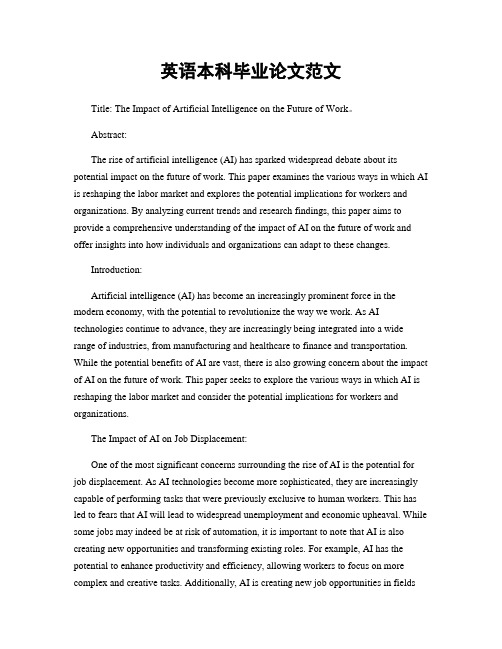
英语本科毕业论文范文Title: The Impact of Artificial Intelligence on the Future of Work。
Abstract:The rise of artificial intelligence (AI) has sparked widespread debate about its potential impact on the future of work. This paper examines the various ways in which AI is reshaping the labor market and explores the potential implications for workers and organizations. By analyzing current trends and research findings, this paper aims to provide a comprehensive understanding of the impact of AI on the future of work and offer insights into how individuals and organizations can adapt to these changes.Introduction:Artificial intelligence (AI) has become an increasingly prominent force in the modern economy, with the potential to revolutionize the way we work. As AI technologies continue to advance, they are increasingly being integrated into a wide range of industries, from manufacturing and healthcare to finance and transportation. While the potential benefits of AI are vast, there is also growing concern about the impact of AI on the future of work. This paper seeks to explore the various ways in which AI is reshaping the labor market and consider the potential implications for workers and organizations.The Impact of AI on Job Displacement:One of the most significant concerns surrounding the rise of AI is the potential for job displacement. As AI technologies become more sophisticated, they are increasingly capable of performing tasks that were previously exclusive to human workers. This has led to fears that AI will lead to widespread unemployment and economic upheaval. While some jobs may indeed be at risk of automation, it is important to note that AI is also creating new opportunities and transforming existing roles. For example, AI has the potential to enhance productivity and efficiency, allowing workers to focus on more complex and creative tasks. Additionally, AI is creating new job opportunities in fieldssuch as data analysis, machine learning, and software development. Therefore, while job displacement is a valid concern, it is important to recognize that AI is also creating new opportunities for workers.The Impact of AI on Job Quality:In addition to job displacement, there is also concern about the impact of AI on the quality of jobs. As AI technologies continue to advance, they have the potential to change the nature of work and the skills required to succeed in the labor market. For example, AI is increasingly being used to perform routine and repetitive tasks, which has the potential to lead to a greater emphasis on non-routine and cognitive skills. This could lead to a shift in the types of jobs available and the skills required to succeed in the labor market. Additionally, there is concern that AI could lead to greater job insecurity and a decline in job quality, as workers may be required to adapt to new technologies and work in more precarious and unstable employment arrangements. Therefore, while AI has the potential to create new opportunities, it is also important to consider the potential implications for the quality of jobs and the skills required to succeed in the labor market.The Impact of AI on Organizational Dynamics:In addition to its impact on individual workers, AI is also reshaping the dynamics of organizations. As AI technologies continue to advance, they are increasingly being integrated into a wide range of organizational processes, from decision-making and customer service to supply chain management and marketing. This has the potential to transform the way organizations operate and the skills and capabilities required to succeed. For example, AI has the potential to enhance decision-making and strategic planning, allowing organizations to make more informed and data-driven decisions. Additionally, AI is creating new opportunities for organizations to automate routine tasks and streamline their operations, which has the potential to enhance productivity and efficiency. However, the integration of AI into organizational processes also raises concerns about the potential for job displacement and the need for workers to adapt to new technologies and work in more dynamic and uncertain environments. Therefore, it isimportant for organizations to consider the potential implications of AI on their operations and the skills and capabilities required to succeed in the future.Conclusion:The rise of artificial intelligence has the potential to reshape the labor market and the way we work. While there are valid concerns about the potential impact of AI on job displacement and job quality, it is important to recognize that AI is also creating new opportunities for workers and organizations. By understanding the potential implications of AI on the future of work, individuals and organizations can better prepare for these changes and adapt to the evolving labor market. Therefore, it is important for policymakers, educators, and business leaders to consider the potential implications of AI on the future of work and develop strategies to ensure that workers are equipped with the skills and capabilities required to succeed in the AI-driven economy.。
英语毕业论文范文模板(热门5篇)

英语毕业论文范文模板(热门5篇)一、引言二、英语论文现状与趋势1.英语论文写作步骤。
一般情下,英语论文写作分为以下几个步骤:首先在写作前应对所给的众多题目进行选择自己能感兴趣的或者够驾驭的,然后再根据所先题查阅相关的资料,在大量的资料中锁定几篇精髓文案进行精读、研究;开始正式写作时一定要列出提纲,这是很多人知道但最容易忽略的细节,提纲看似简单,但对后面的写作有着至关重要的作用,提纲有一定的指导作用,不致让人写到中途的时候偏离了主题,使先前所做工作功亏一篑,所以写作前一定要列提纲;然后进入正式写作时,在完成论文之后应从头再阅读一篇,对其中所存在错漏进行修改、增添,而在还需要证实的地方应再次查阅资料,进行一定的修改,最后形成一篇有理有据,内容丰富充实的高质量的终稿。
3.英语论文所出现的具体问题。
英语作为中国学生的第二语言,英语论文对于中国学生也是非常重要的,而且论文是综合能力求较高写作。
英语论文写作除了上面已提到过的一些不足以外还存由于语言方面的其它问题,下面将一一分析这些问题。
论文语体不正式,不规范;主观语句过多使用,而且经常过多使用简单句,使得整篇论文过于口语化,另外在用词方面,一篇论文出现大量词句重复使用,使得文章读起来累赘、空泛。
4.英语论文写作特点与意义。
通过英语论文写作,学生能从其中提高对问题综合分析能力、写作能力、科研能力等,也同时对学生创新思维能力也有一定的提高。
这一系列能力的提升将最终有益学生个人发展,以改变一些论文中存在对各种信息、数据堆砌而没有自己的思想和观点的现象。
提高学生对所学的知识的应用,让其能够学以致用,并能根据所学知识从不同的角度全方位对问题进行认识、分析、研究和判断。
三、如何提高英语论文写作1.正确认识英语论文的写作目的。
与一般写作不同,论文的撰写对于人们在学习、工作要求相对来说比较高,而且也相对更重要。
因此必须让从事论文写作的学生与工作人员意识到论文写作的重要性,随全球化进程的不断推进,英语论文的地位也越来越重,英语论文的优劣将会影响到个人职业发展与人生前途。
毕业论文演讲稿英语范文
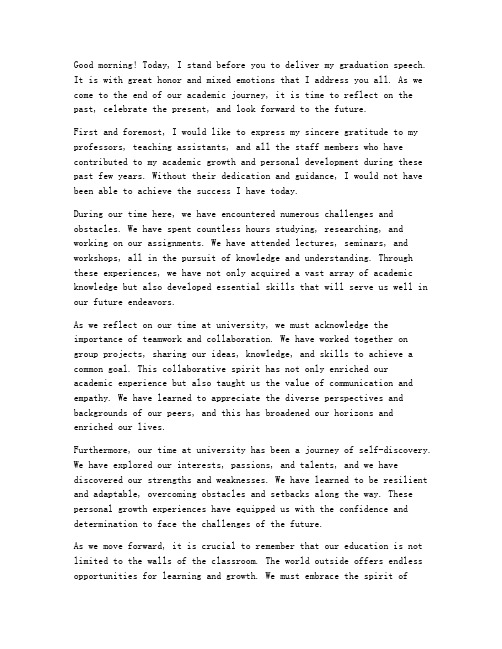
Good morning! Today, I stand before you to deliver my graduation speech. It is with great honor and mixed emotions that I address you all. As we come to the end of our academic journey, it is time to reflect on the past, celebrate the present, and look forward to the future.First and foremost, I would like to express my sincere gratitude to my professors, teaching assistants, and all the staff members who have contributed to my academic growth and personal development during these past few years. Without their dedication and guidance, I would not have been able to achieve the success I have today.During our time here, we have encountered numerous challenges and obstacles. We have spent countless hours studying, researching, and working on our assignments. We have attended lectures, seminars, and workshops, all in the pursuit of knowledge and understanding. Through these experiences, we have not only acquired a vast array of academic knowledge but also developed essential skills that will serve us well in our future endeavors.As we reflect on our time at university, we must acknowledge the importance of teamwork and collaboration. We have worked together on group projects, sharing our ideas, knowledge, and skills to achieve a common goal. This collaborative spirit has not only enriched our academic experience but also taught us the value of communication and empathy. We have learned to appreciate the diverse perspectives and backgrounds of our peers, and this has broadened our horizons and enriched our lives.Furthermore, our time at university has been a journey of self-discovery. We have explored our interests, passions, and talents, and we have discovered our strengths and weaknesses. We have learned to be resilient and adaptable, overcoming obstacles and setbacks along the way. These personal growth experiences have equipped us with the confidence and determination to face the challenges of the future.As we move forward, it is crucial to remember that our education is not limited to the walls of the classroom. The world outside offers endless opportunities for learning and growth. We must embrace the spirit oflifelong learning and continue to seek knowledge and wisdom. The knowledge we have acquired here is a foundation upon which we can builda successful future.Now, let us take a moment to celebrate our achievements. We have successfully completed our academic requirements and earned our degrees. This is a significant milestone in our lives, and we should be proud of ourselves. We have come a long way, and we have overcome many challenges. Our hard work, perseverance, and dedication have paid off, and we can now move on to the next chapter of our lives.However, with success comes responsibility. As we step into the world, we must remember that we are part of a larger community. We have a duty to use our knowledge and skills to make a positive impact on society. We must strive to be ethical, compassionate, and socially responsible individuals. Let us use our education to contribute to the betterment of our communities, our nation, and the world.In conclusion, I would like to leave you with a few words of advice. Firstly, never underestimate the power of determination and perseverance. Life is full of challenges, and we must be prepared to face them head-on. Secondly, always remain curious and open-minded. The world is a vast and ever-changing place, and there is always something new to learn. Lastly, never forget to cherish the friendships and relationships you have formed during your time here. These connections will be invaluable asyou navigate the complexities of the future.Ladies and gentlemen, as we bid farewell to this institution and embark on our new journey, let us do so with confidence, hope, and gratitude. We have been blessed with a remarkable education, and we have the potential to achieve great things. Let us use our knowledge and skillsto make a difference in the world and leave a lasting legacy.Thank you, and may God bless us all on our journey ahead.[Applause]。
本科生英语专业毕业论文范文
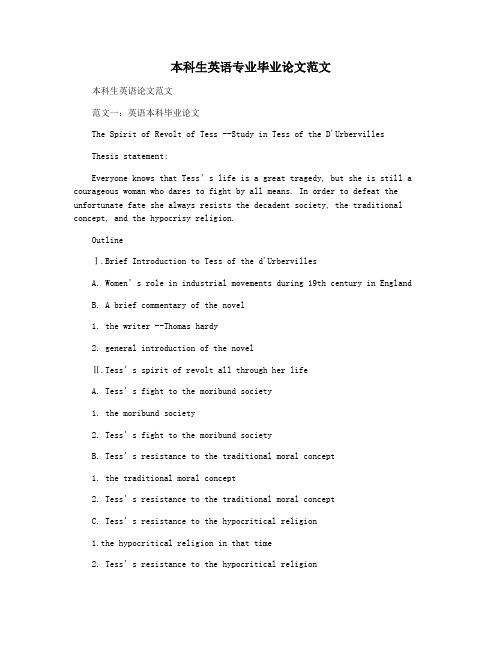
本科生英语专业毕业论文范文本科生英语论文范文范文一:英语本科毕业论文The Spirit of Revolt of Tess --Study in Tess of the D'UrbervillesThesis statement:Everyone knows that Tess’s life is a great tragedy, but she is still a courageous woman who dares to fight by all means. In order to defeat the unfortunate fate she always resists the decadent society, the traditional concept, and the hypocrisy religion.OutlineⅠ.Brief Introduction to Tess of the d'UrbervillesA. Women’s role in industrial movements during 19th century in EnglandB. A brief commentary of the novel1. the writer --Thomas hardy2. general introduction of the novelⅡ.Tess’s spirit of revolt all through her lifeA. Tess’s fight to the moribund society1. the moribund society2. Tess’s fight to the moribund societyB. Tess’s resistance to the traditional moral concept1. the traditional moral concept2. Tess’s resistance to the traditional moral conceptC. Tess’s resistance to the hypocritical religion1.the hypocritical religion in that time2. Tess’s resistance to the hypocritical religionD. Tess’s resistance to the unfort unate marriage1.Tess’s unfortunate marriage2. Tess’s resistance to the unfortunate marriageⅢ.Conclusion: In a word, Tess has shown a powerful woman's image to common people with her unyielding spirit of revolt. She, to the moribund society, traditional old morals, hypocritical religion, capitalist marriage system, has carried on the strongest revealing and criticism. Her kindhearted enlightenment, noble emotion, strong personality, and her resistance inimbuing all rooted in the hearts of the people forever, worth savoring.AbstractThis paper mainly focuses on the spirit of revolt of Tess. First of all, this paper begins with a brief introduction to the novel. Then, this paper makes a brief commentary of the novel. Moreover, it concen trates on :1 Tess’s fight to the moribund society. 2 Tess’s resistance to the traditional moral concept. 3 Tess’s resistance to the hypocritical religion. 4 Tess’sresistance to the unfortunate marriage. And at last the paper reveals thatTess is actually a character with the spirit of revolt all through her life.key of revolt,industrial movement,unfortunate fate内容提要本文研究的是小说主人公“苔丝”的“反抗精神”。
英语专业毕业论文范文模板
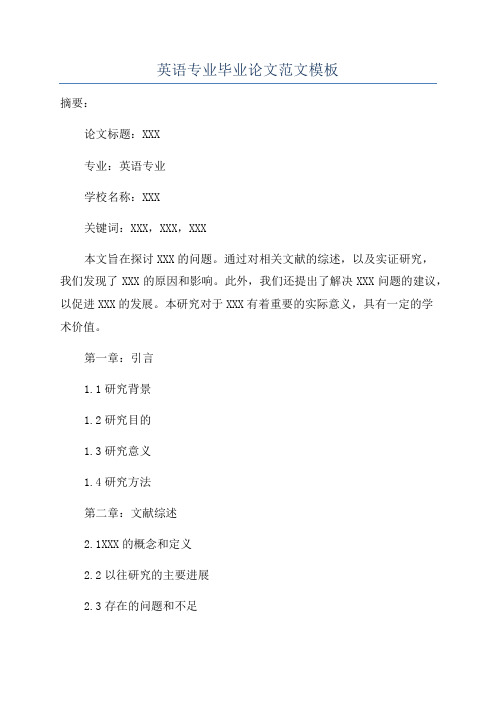
英语专业毕业论文范文模板摘要:论文标题:XXX专业:英语专业学校名称:XXX关键词:XXX,XXX,XXX本文旨在探讨XXX的问题。
通过对相关文献的综述,以及实证研究,我们发现了XXX的原因和影响。
此外,我们还提出了解决XXX问题的建议,以促进XXX的发展。
本研究对于XXX有着重要的实际意义,具有一定的学术价值。
第一章:引言1.1研究背景1.2研究目的1.3研究意义1.4研究方法第二章:文献综述2.1XXX的概念和定义2.2以往研究的主要进展2.3存在的问题和不足第三章:实证研究3.1研究设计3.2研究对象及样本选择3.3数据收集和分析3.4结果和讨论第四章:问题原因和影响分析4.1问题的原因4.2问题的影响第五章:解决方案和建议5.1解决方案的选择5.2解决方案的实施5.3建议和启示第六章:总结与展望6.1研究总结6.2研究不足和展望附录:实证研究数据(可选)致谢:首先,我要感谢我的指导教师XXX老师对我毕业论文的悉心指导和帮助。
在整个研究过程中,老师给予了我许多宝贵的建议和意见,使我能够更好地完成论文。
其次,我要感谢我的家人和朋友在我撰写论文过程中的支持和鼓励。
最后,我还要感谢所有参与本研究的被试者和提供数据的单位。
致谢词可能根据实际情况进行调整。
本人郑重声明所呈交的毕业论文是本人在导师指导下进行的研究工作及取得的研究成果。
除文中已经注明的内容外,本论文不包含任何其他人或机构已经发表或公开发表过的研究成果。
对本论文的研究做出重要贡献的个人和集体,均已在论文中作了明确的说明并表示谢意。
如有违反上述声明,本人愿意承担一切相关责任。
毕业论文英文专业毕业范文
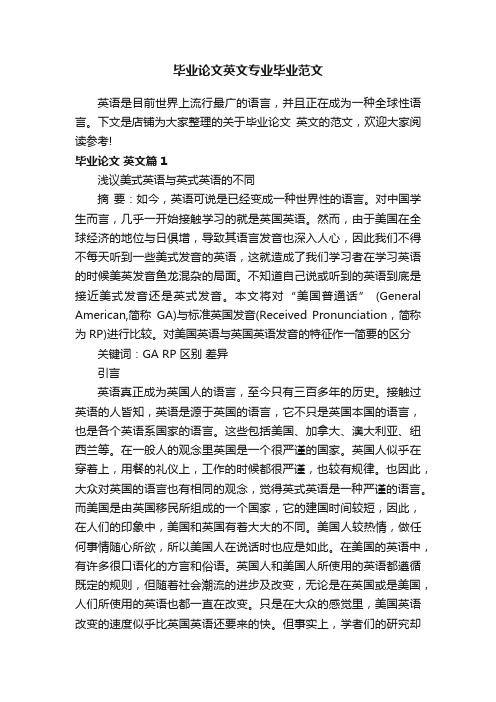
毕业论文英文专业毕业范文英语是目前世界上流行最广的语言,并且正在成为一种全球性语言。
下文是店铺为大家整理的关于毕业论文英文的范文,欢迎大家阅读参考!毕业论文英文篇1浅议美式英语与英式英语的不同摘要:如今,英语可说是已经变成一种世界性的语言。
对中国学生而言,几乎一开始接触学习的就是英国英语。
然而,由于美国在全球经济的地位与日俱增,导致其语言发音也深入人心,因此我们不得不每天听到一些美式发音的英语,这就造成了我们学习者在学习英语的时候美英发音鱼龙混杂的局面。
不知道自己说或听到的英语到底是接近美式发音还是英式发音。
本文将对“美国普通话” (General American,简称GA)与标准英国发音(Received Pronunciation,简称为RP)进行比较。
对美国英语与英国英语发音的特征作一简要的区分关键词:GA RP 区别差异引言英语真正成为英国人的语言,至今只有三百多年的历史。
接触过英语的人皆知,英语是源于英国的语言,它不只是英国本国的语言,也是各个英语系国家的语言。
这些包括美国、加拿大、澳大利亚、纽西兰等。
在一般人的观念里英国是一个很严谨的国家。
英国人似乎在穿着上,用餐的礼仪上,工作的时候都很严谨,也较有规律。
也因此,大众对英国的语言也有相同的观念,觉得英式英语是一种严谨的语言。
而美国是由英国移民所组成的一个国家,它的建国时间较短,因此,在人们的印象中,美国和英国有着大大的不同。
美国人较热情,做任何事情随心所欲,所以美国人在说话时也应是如此。
在美国的英语中,有许多很口语化的方言和俗语。
英国人和美国人所使用的英语都遵循既定的规则,但随着社会潮流的进步及改变,无论是在英国或是美国,人们所使用的英语也都一直在改变。
只是在大众的感觉里,美国英语改变的速度似乎比英国英语还要来的快。
但事实上,学者们的研究却认为美式英语在某些层面上比英式英语还要守旧。
此外,学者们也认为造成两者差异最大的原因是因为自然环境的不同。
英语本科毕业论文 范文

英语本科毕业论文范文英语本科毕业论文范文随着全球化的不断发展,英语作为一种国际语言的地位日益重要。
因此,越来越多的大学生选择在英语专业进行本科学习,并完成一篇英语本科毕业论文。
本文将以范文的形式展示一篇关于英语本科毕业论文的内容,以供参考。
引言:英语作为一门语言学科,涉及广泛的研究领域,包括语法、词汇、语音、语用等。
本篇论文旨在探讨英语作为第二语言学习者的语法错误分析,并提出相应的教学策略,以提高学习者的语法水平。
第一部分:语法错误分析在第一部分中,本文将对英语作为第二语言学习者的语法错误进行分析。
通过对学习者的写作和口语中的错误进行收集和分类,可以发现学习者在语法方面的常见错误类型,如主谓一致、时态错误、冠词使用错误等。
通过对这些错误的分析,可以帮助教师更好地了解学习者的语法水平和问题所在。
第二部分:语法教学策略在第二部分中,本文将提出一些针对英语第二语言学习者的语法教学策略。
首先,教师可以根据学习者的语法错误类型设计相关的练习和活动,以帮助学习者加深对语法规则的理解和运用。
其次,教师可以引入语法规则的实际运用场景,通过真实语境的演练,培养学习者的语法意识和应用能力。
此外,教师还可以利用技术手段,如在线语法纠错工具和语法学习软件,提供个性化的语法学习支持。
第三部分:语法教学评估在第三部分中,本文将讨论语法教学的评估方法。
通过对学习者的语法错误进行评估,可以了解学习者在语法学习中的进展和问题,并及时调整教学策略。
本文将介绍一种常用的语法教学评估方法,即语法测试。
通过设计一套包含不同难度和类型题目的语法测试,可以全面地评估学习者的语法水平,并为后续的教学提供指导。
结论:通过对英语本科毕业论文的范文进行阐述,我们可以看到,语法错误分析、语法教学策略和语法教学评估是英语教育领域中的重要研究方向。
通过对学习者的语法错误进行分析,教师可以更好地了解学习者的问题所在,并采取相应的教学策略来提高学习者的语法水平。
- 1、下载文档前请自行甄别文档内容的完整性,平台不提供额外的编辑、内容补充、找答案等附加服务。
- 2、"仅部分预览"的文档,不可在线预览部分如存在完整性等问题,可反馈申请退款(可完整预览的文档不适用该条件!)。
- 3、如文档侵犯您的权益,请联系客服反馈,我们会尽快为您处理(人工客服工作时间:9:00-18:30)。
英语毕业论文范文1 毕业设计(论文)首行居中,小二号字,粗体Introduction 论文正文段落,首行缩进4个字母,TimesNew Roman字体,小四号,1.25倍行距空一行Although literary translation as an activity is as old as anycultural activity that man has known, literary translation as an academic discipline is of recent origin. It is generally believed that it began with James Holmes, who made the founding statement in his paper entitled “The Name and Nature of Translation Studies” which he presented in 1972 at the Third International Congress of Applied Linguistics in Copenhagen. (James Holmes, 1972:55)Literary translation plays an indispensable and irreplaceable rolein communication across language and cultures. As far as its basic definition is concerned, the major task of literary translation is to turn the cultural content in one language into another, so whether it is faithful or not largely depends on the degrees of the translator’s grasp of the two languages and the subtle difference of the cultural content expressed in the languages. Thus literary translation will inevitably encounter the problem of culture and its representations.To deal with this problem, theorists have come up with two kinds of approaches that have aroused heated debates. This thesis sets out to study the two strategies on literary translation across the linguisticand cultural differences: one is domestication and the other is foreignization.Domestication refers to target-language-culture-oriented translation in which expressions acceptable in target language culture are exploited in order to make the translated texts intelligible and suitable for the target text readers. Foreignization issource-language-culture-oriented translation, which strives to preserve as much as possible the original flavor in order to retain the foreignness of the source language culture.There exist conflicting opinions on the choosing of these twoliterary translation strategies in western and Chinese translation field. In western countries, Goethe brings upththese two literary translation strategies first. The same idea is held by the 19-centurylinguists such as Humboldt, Schlegel, Schleiermacher. Theyconsidered each language immeasurable in its own individuality. Lawrence Venuti coined two terms domesticating translation and foreignizing translation on describes the two different translation strategies.The terms may be new to the Chinese, but the concepts they carryhave been at least for a century at the heart of most translation controversies. Lu Xun once said that “beforetranslating, the translator has to make a decision: either to adapt the original text or to retain as much as possible the foreign flavor of the original text”. (Luo Xinzhang, 1984:315) On thestthreshold of the 21 century, application of these theories to studying domestication and12 毕业设计(论文)foreignization becomes popular and stimulates another round of dispute over the two strategies. The new round of discussion begins to shift its focus from which strategy is better to which one should be the dominant strategy in the current literary translation in China. For example, Sun Zhili call for the dominance of foreignization while Cai Ping etc., call for dominance of domestication.Since literary translation is where the dispute of domestication and foreignization most often arises, this study will mainly focus on the choice of strategies in literary translation while touching upon the translation of other subject matters. This study, with its tentative characteristic, is not intended to give a final answer to this controversy but rather to provide some implications for the handling of the two strategies in actual practice and the further study of them.23 毕业设计(论文)首行居中,小二号字,粗体,章的标号后不加点,以下各章1 Literary Translation Studies 均另起一页。
空一行Literary translation, traditionally denigrated as a second-rate or second-hand activity, is being seen as a unique form of creativity and an act of research. So in this thesis, if we want to discuss theliterary translation strategies, we should well know what literary translation is and what the differences between literary translation and non-literary translation are.二级标题与正文首字对齐,上下各空一行,小三号字,粗体1.1 Definition of Literary TranslationMao Dun says, “Literary translation is to reproduce in another language the artisticimages of the original work so that the reader of the translation may be inspired, moved and aesthetically entertained in the same way as he would in reading the original” (Luo Xinzhang, 1984:511). As the name implies, literary translation is the translation of literature or other artistic texts such as film scripts, dramatic texts or music lyrics, as opposed to the translation of explanatory prose such as information pamphlets, technical manuals, records, scientific papers, legal documents and the like. This is not mean to be an exhaustive definition, and of course, there will be always be borderline cases where it could be difficult to draw a clear line between literary translation and other kinds of translation, but for the purpose of this paper, this definition will suffice.1.2 The Debate over Literary Translation and Non-literaryTranslationTranslation can be roughly divided into literary translation andnon-literary translation. This is not an adequate division, but it serves the purpose of the present study. The division is obviously based on text types, for translation is generally believed to be a text-oriented event. Many theorists have divided texts according to subject matter, and some others prefer to divide them according to the functions of the language.34 毕业设计(论文)当新节或小节位于一页的最后一行时,串到下一页.1.2.1 Difference in artistic natureLiterature is a kind of art, or the art of language, to be specific; so literary translation is also the art of language. In a literary text, artistic values are generated by linguistic forms, which convey the author’s vision, tone and attitude; which embody the mingling or shifting of points of view; which add to the affective or emotive force of the message’ which contribute to characterization and make fictional reality function more effectively in the thematic unity. Generally speaking, the task of literary translation is to tender logical images or artistic images of actual life involved in the original from one language to another.Literary translation is more a bilingual art than a bilingual craft. According to A.S. Push kin, the aim of literary translation is toreproduce an artistic work. (Bassnatt, M.Suan, 1991:14) The translator must first understand the content and style of the original thoroughly and profoundly, and then creatively and accurately reproduce it in the target language. Some scholars even consider literary translation part of the study of comparative literature. The primary difference between literary translation and other forms of translation is the question of artistic merit. While the form and the register are important even in non-literary translation, e.g. the accepted high register and specific form characteristic of scientific discourse may be required in anarticle for a professional journal, literary style and artistic merit are not usually important considerations.1.2.2 Difference in target readersDifferent texts are meant for different readers, so are different translations. “The target audience for which a translation is made almost always constitutes a major factor in determining the translation procedures and the level of language to be employed” (Nida, 2001:102). It is beyond all doubt that language should match its readers. Non-literary translations are, as a rule, made for experts in a particular field, i.e. for a rather homogeneous group of readers who want to inform themselves about new developments and results in science and technology. What they demand of a translation in their field is the information conveyed by the language rather than the language proper. Besides, they are normally captive. That’s why some non-literary papers and books are poorly translated.Literary translations, however, are not intended for a particular target group. They have a much larger readership, ranging from common readers to literature critics or translation scholars. In effect, anyone with enough reading knowledge is a prospective reader, who is free to choose and buy what is not only intelligible but appreciated because of its stylistic features, the need for more adequate translating is obvious. It often defeats a literary translator to45 毕业设计(论文)satisfy readers with different tastes and at different levels. Hence literary translation is a more demanding job.56 毕业设计(论文)另起一页,首行居中,小二号字,粗体2 Linguistic and Cultural Differences in LiteraryTranslationLinguistic and cultural differences are the key terms in the discussion of literary translation. To discuss the two translation strategies, a translator needs, first of all, to have a correct understanding of linguistic and cultural differences.2.1 Language and Culture67 毕业设计(论文)另起一页,首行居中,小二号字,粗体Conclusion空一行Since culture influences language and language in turn reflects culture, the transmission of linguistic and cultural differences in literary translation is an obligatory task. The transfer of cultural elements is made possible on the basis of mutual intelligibility between people in different cultures. However, confronted with two strikingly different language-culture systems like English and Chinese, the translator is expected to translate by narrowing the cultural gaps. He has to bear in mind the translator's dual role as a bilinguist and a biculturalist and the cultural functions of literary translation. It is a significant task for the translator to introduce the source cultural elements, that is, the culture specific words, expressions and some special rhetoric devices unique to the source language system. At the same time, it is also the translator's task to ensure that his translation is intelligible and acceptable to the reader. To fulfill the goals proposed above, the translator has to find a balance between the approaches of foreignization and domestication.78 毕业设计(论文)另起一页,首行居中,小二号字,粗体Bibliography空一行[1] Bassnett, M.Suan. Translation Studies [M]. London and New York: Rout ledge, 1991.[2] James Holmes. The Name and Nature of Translation Studies [M]. Copenhagen: The ThirdInternational Congress of Applied Linguistic, 1972.[3] New mark, Peter. A Textbook of Translation [M]. Shanghai: Shanghai Foreign LanguagePress, 2001.[4] New mark, Peter. About Translation [M]. Cleve don: Multilingual Matters Press, 1991. [5] New mark, Peter. Approaches to Translation, Oxford: Special Reference to Principles andProcedures Involved in Bible Translating [M], Lei den: E .J.Brill, 1981. [12] 成昭伟.试论翻译中的文化因素及其处理[D].湖南:湖南师范大学硕士学位论文,1999.[17] 蒋学军.论英语幽默寓言的翻译[J].南华大学学报,2001. [18] 金惠康.跨文化交际翻译续篇[M].北京:中国对外翻译出版公司,1997. [19] 黎照.鲁迅、梁实秋论战实录[M].华龄出版社,1997.[20] 刘宓庆.当代翻译理论[M].北京:中国对外出版公司,1999. [21] 罗新璋.翻译论集[M].商务印书馆,1984.[22] 孙致礼.“中国的文学翻译:从归化趋向异化”[J],中国翻译,2002.[23] 谭载喜.新编奈达翻译[M].北京:中国对外翻译出版公司,1999. [24] 王佐良.翻译:思考与试笔[M].外语教学与研究出版社,1989.89 毕业设计(论文)另起一页,首行居中,小二号字,粗体Acknowledgements空一行In the completion of this thesis, I am extremely grateful to my supervisor, Professor Wang Xiaoli, for her instruction and enlightenment concerning stylistics and other fields, valuable suggestion during the period in which this thesis was being written, generosity in spending his revising this thesis meticulously, and her encouragement as well.And from the bottom of my heart, I wish to thank all those who directly or indirectly contributed to this thesis by giving me their encourage, advice and practical help.内部资料,请勿外传~910 毕业设计(论文)1011 毕业设计(论文)11。
